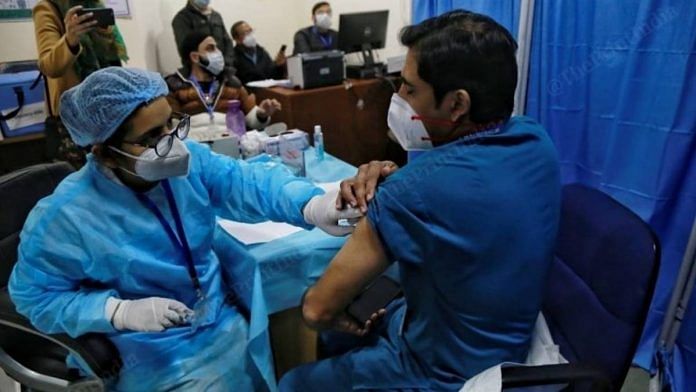New Delhi: Covid vaccines reduce virus transmission besides offering protection against the infection, according to researchers from the University of Oxford in the UK.
However, the effect on transmission of the Delta variant wanes three months after the second dose for the two vaccines studied — the ones by Pfizer and Oxford-AstraZeneca, the researchers said. The reduction in protection against transmission, they added, was more stark in the case of the latter vaccine, which is manufactured and marketed in India as Covishield.
In a study, which is yet to be peer-reviewed, the researchers found that the likelihood of transmission from vaccinated individuals was low for both Alpha and Delta variants. However, they said, the latter erodes some of the vaccine-associated protection against transmission.
This could be because the Delta variant makes infections more common, which increases the likelihood of transmission from vaccinated individuals who become infected, they added.
The study may also explain why the Delta variant is causing a surge in Covid cases even among populations with a high vaccine coverage.
For the research, the study authors used large-scale contact tracing data from over 1,39,164 people in the UK.
The found that both the Pfizer–BioNTech mRNA vaccine and the ChAdOx1 — developed by Oxford University and the British-Swedish firm AstraZeneca — reduce transmission of SARS-CoV-2 from infected individuals.
Also read: Merck Covid pill raises new hope of reducing hospitalisation & death by up to 50%
‘Pfizer offers better protection against transmission’
It had been hypothesised earlier that vaccines reduce viral loads, and since higher viral loads are associated with higher transmission, vaccination would also reduce transmission.
However, the Oxford researchers pointed out that while vaccination allows the viable infectious virus to clear out faster, it leaves behind damaged ineffective viral particles that are still detected by Covid tests.
They further noted that fully vaccinated individuals infected with the Delta variant who got the Pfizer vaccine had lower odds of spreading the virus further, compared to those who received the AstraZeneca-Oxford vaccine.
The team also observed that this protection against onward transmission waned three months after the second dose for both vaccines.
Even after the protection wanes, it is still adequate to reduce the transmission of the Alpha variant. However, the protection is significantly eroded in the case of the Delta variant, particularly for Covishield.
Three months after the second dose of Covishield, there was no difference in transmission of the Delta variant between vaccinated and unvaccinated individuals, the researchers said.
They added that this waning of protective behaviour over time may have been a factor of reduced social distancing and mask-wearing over time.
However, since studies have shown that antibody levels reduce over time in vaccinated individuals, there may be biological explanations as well for this waning protection.
The authors suggest that eventually, booster vaccinations can help control transmission as well as prevent infections.
(Edited by Rachel John)
Also read: Talk of Covid booster shots not pertinent, studies show antibodies last a year: ICMR chief



